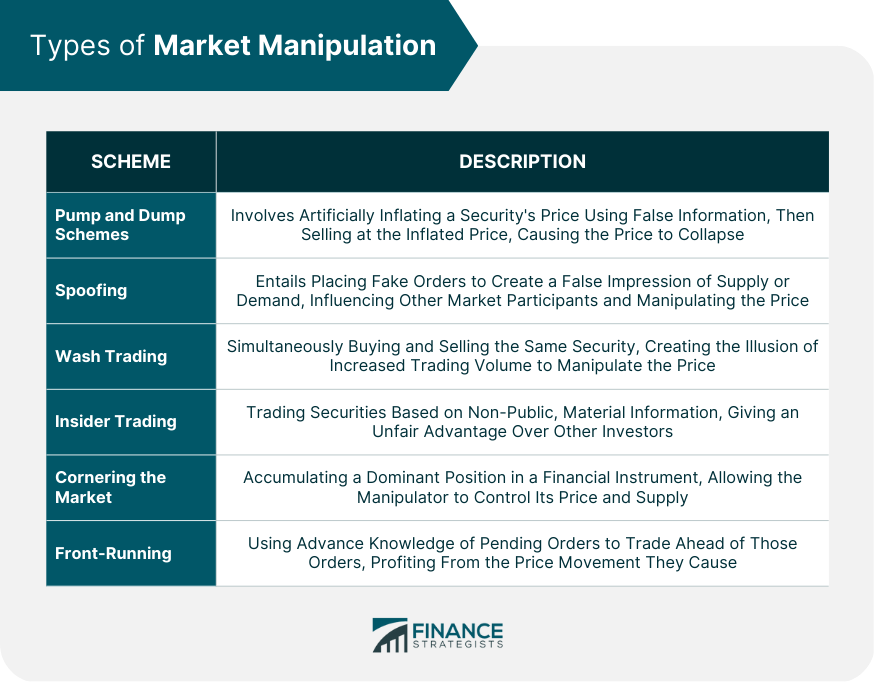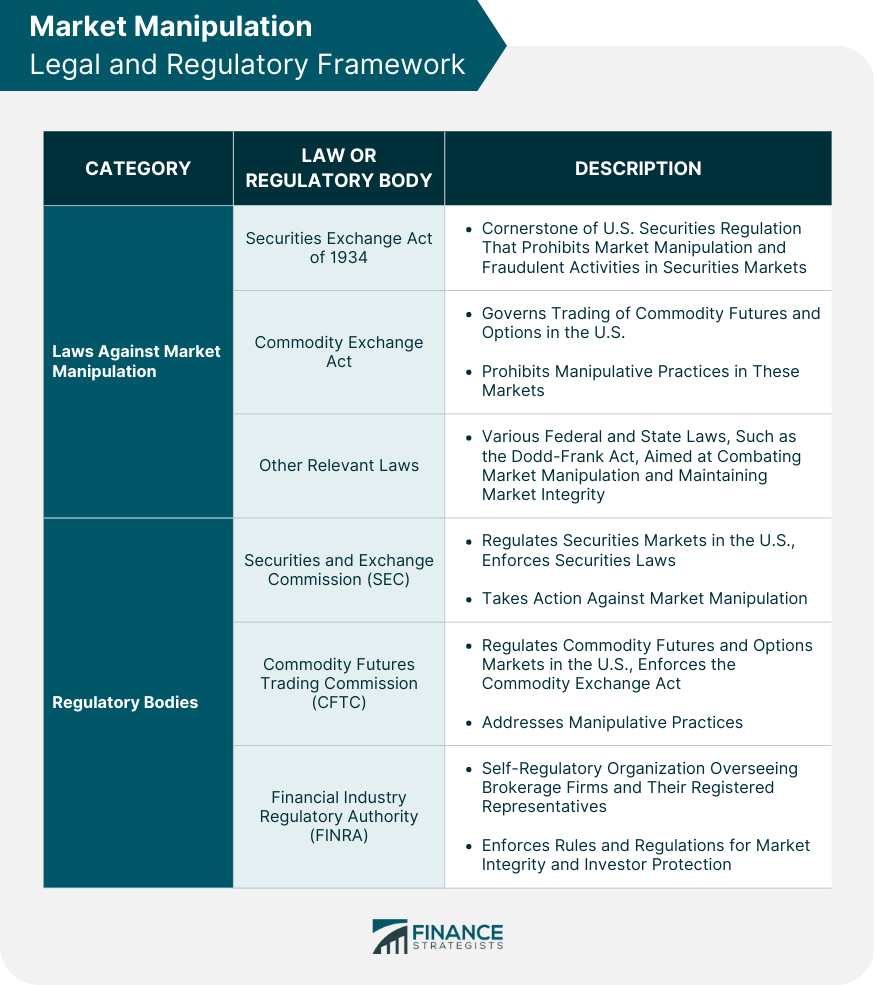Market manipulation refers to illegal activities that are designed to distort the market's natural supply and demand. It involves an intentional act of creating false or misleading information to influence the price of securities, commodities, or other financial instruments. Market manipulation can take many forms, including insider trading, spreading false rumors, or using complex trading strategies to artificially inflate or deflate prices. It is prohibited by various regulatory bodies, as it can have a detrimental effect on market integrity and investor confidence. Pump and dump schemes involve artificially inflating the price of a security through false or misleading information, then selling the security at its inflated price, causing the price to collapse and leaving other investors with significant losses. Pump and dump schemes are particularly prevalent in the penny stock market and on social media platforms, where misinformation can spread rapidly. These schemes can cause significant financial losses for unsuspecting investors and erode trust in financial markets. Spoofing involves placing fake orders in the market with no intention of executing them, to create a false impression of supply or demand, which influences other market participants and manipulates the price of the security. Spoofing has been observed in various financial markets, including equities, futures, and cryptocurrencies. Spoofing distorts market information and can lead to inefficient pricing, causing financial losses for investors and undermining market integrity. Wash trading involves an individual or entity simultaneously buying and selling the same security, creating the illusion of increased trading volume, which can attract other investors and manipulate the price of the security. Wash trading has been observed in stock markets, commodities markets, and cryptocurrency exchanges. This type of market manipulation can lead to artificial price movements, negatively impacting investors and undermining the credibility of financial markets. Insider trading involves individuals with access to non-public, material information about a company trading its securities based on that information, giving them an unfair advantage over other investors. Prominent examples of insider trading include the cases involving Martha Stewart and Raj Rajaratnam. Insider trading erodes trust in financial markets, as it creates an uneven playing field for investors and can lead to significant financial losses for those not privy to the inside information. Cornering the market involves accumulating a dominant position in a particular security, commodity, or other financial instrument, allowing the manipulator to control the price and supply of that instrument. The Hunt brothers' attempt to corner the silver market in the late 1970s and early 1980s is a well-known example of this type of market manipulation. Cornering the market can lead to significant price distortions, supply disruptions, and financial instability, ultimately harming investors and the broader economy. Front-running involves using advance knowledge of pending orders or trades, typically gained through access to privileged information or technology, to trade ahead of those orders and profit from the price movement they cause. Front-running can occur in various financial markets, including equities, futures, and foreign exchange. Front-running undermines the fairness of financial markets, as it allows certain participants to profit at the expense of others and can lead to inefficient pricing and financial losses for other investors. Market manipulation can cause significant financial losses for investors, undermine their confidence in financial markets, and create an uneven playing field that disadvantages those who are not privy to inside information or manipulative techniques. Market manipulation erodes trust in the functioning of financial markets, as it distorts pricing mechanisms and undermines the efficient allocation of capital. This can lead to reduced participation in financial markets and a negative perception of their legitimacy. Market manipulation can tarnish the reputation of financial institutions, especially if they are found to be involved in or facilitating manipulative practices. This can lead to a loss of clients, increased regulatory scrutiny, and significant financial penalties. Market manipulation can contribute to financial instability and economic uncertainty, as it distorts the allocation of resources and can lead to the formation of asset bubbles or other market disruptions. The Securities Exchange Act of 1934, a cornerstone of U.S. securities regulation, contains provisions that prohibit market manipulation and other fraudulent activities in the securities markets. The Commodity Exchange Act governs the trading of commodity futures and options in the United States and contains provisions that prohibit manipulative practices in these markets. Various other federal and state laws, such as the Dodd-Frank Wall Street Reform and Consumer Protection Act, also contain provisions aimed at combating market manipulation and maintaining market integrity. The Securities and Exchange Commission (SEC) is responsible for regulating the securities markets in the United States, enforcing securities laws, and taking action against those involved in market manipulation. The Commodity Futures Trading Commission (CFTC) is responsible for regulating the commodity futures and options markets in the United States, enforcing the Commodity Exchange Act, and addressing manipulative practices in these markets. Financial Industry Regulatory Authority (FINRA) is a self-regulatory organization that oversees brokerage firms and their registered representatives, enforcing rules and regulations aimed at maintaining market integrity and investor protection. Regulatory bodies, such as the SEC and CFTC, have taken numerous enforcement actions against individuals and entities involved in market manipulation, ranging from civil penalties to criminal charges. Those found guilty of market manipulation can face significant fines, penalties, and disgorgement of illicit profits, as well as other sanctions, such as trading bans or asset freezes. In some cases, market manipulation can result in criminal charges, which can lead to imprisonment and other criminal penalties. Regulatory bodies play a crucial role in preventing and detecting market manipulation by establishing and enforcing rules and regulations designed to maintain market integrity. They conduct surveillance and monitoring of market activity and take enforcement actions against those found to be engaging in manipulative practices. Regulators and financial institutions use advanced surveillance and monitoring techniques, including algorithms and artificial intelligence, to detect and analyze suspicious trading activity that may indicate market manipulation. Financial institutions are responsible for implementing robust compliance programs, conducting due diligence on clients, and monitoring trading activity to identify and prevent manipulative practices. They also have an obligation to report suspicious activity to regulatory authorities. Individual investors can help prevent market manipulation by remaining vigilant, conducting thorough research before making investment decisions, and reporting any suspected manipulative activity to regulatory authorities. Maintaining market integrity is essential for the efficient functioning of financial markets and the broader economy. By understanding the various types of market manipulation, their impact, and the legal and regulatory frameworks in place to address them, we can better detect and prevent these practices from occurring. Regulatory bodies, financial institutions, and individual investors all have a role to play in maintaining market integrity and ensuring a fair and transparent environment for all participants. Ongoing challenges, such as the rapid development of technology and the increasing complexity of financial markets, require continued vigilance and adaptation of regulatory frameworks and surveillance techniques. By working together, stakeholders can help safeguard financial markets from manipulation and foster a healthy, stable, and trustworthy investment environment to benefit all participants and the overall economy. Consult a financial advisor for more information on market manipulation.What Is Market Manipulation?
Types of Market Manipulation
Pump and Dump Schemes
Spoofing
Wash Trading
Insider Trading
Cornering the Market
Front-Running

Impact of Market Manipulation
Effects on Investors
Effects on Market Integrity
Effects on Financial Institutions
Effects on the Overall Economy
Legal and Regulatory Framework
Laws Against Market Manipulation
Securities Exchange Act of 1934
Commodity Exchange Act
Other Relevant Laws
Regulatory Bodies
Securities and Exchange Commission
Commodity Futures Trading Commission
Financial Industry Regulatory Authority

Enforcement Actions and Penalties
Examples of Enforcement Actions
Fines and Penalties
Criminal Charges
Preventing and Detecting Market Manipulation
Role of Regulatory Bodies
Surveillance and Monitoring Techniques
Role of Financial Institutions
Role of Individual Investors
Conclusion
Market Manipulation FAQs
Market manipulation can take many forms, including insider trading, spreading false rumors, or using complex trading strategies to artificially inflate or deflate prices. Other examples include painting the tape, wash trading, and spoofing.
Market manipulation can create an unfair playing field for investors, making it difficult to accurately value securities and make informed decisions. This can result in significant financial losses for investors and undermine confidence in the markets.
Market manipulation is illegal under various laws and regulations, including the Securities Exchange Act of 1934 and the Commodity Exchange Act. Those found guilty of market manipulation can face significant fines, imprisonment, and civil penalties.
Regulators use various tools and techniques to detect and prevent market manipulation, including surveillance systems, data analysis, and investigations. Regulators also work with market participants to develop best practices and guidelines for preventing market manipulation.
Investors can protect themselves from market manipulation by diversifying their portfolios, conducting due diligence, and staying informed about market conditions and news. It is also important to work with reputable financial professionals and to report any suspected cases of market manipulation to regulatory authorities.
True Tamplin is a published author, public speaker, CEO of UpDigital, and founder of Finance Strategists.
True is a Certified Educator in Personal Finance (CEPF®), author of The Handy Financial Ratios Guide, a member of the Society for Advancing Business Editing and Writing, contributes to his financial education site, Finance Strategists, and has spoken to various financial communities such as the CFA Institute, as well as university students like his Alma mater, Biola University, where he received a bachelor of science in business and data analytics.
To learn more about True, visit his personal website or view his author profiles on Amazon, Nasdaq and Forbes.















